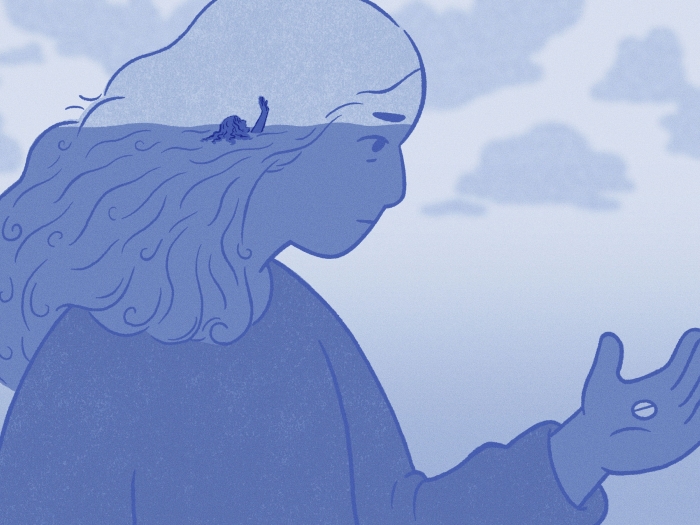The start of college comes with expectation and excitement, but it also can trigger depression. A Michigan Medicine psychiatrist offers advice to ease the transition.
7:00 AM
Author |

Making the leap from high school to college is a big deal, no matter how far from home a soon-to-be freshman is headed.
MORE FROM MICHIGAN: Sign up for our weekly newsletter
But the positive (yet often hectic) milestone can shake a student's well-being, with unintended effects such as depression.
"It's a huge transition for everyone, whether you have a history of depression or not," says Dayna LePlatte, M.D., a clinical instructor in psychiatry at the University of Michigan Medical School. "You're living on your own, taking on more responsibility and academic demands.
"It can be tough."
And it marks a key time for signs of trouble to surface: 75 percent of mental health conditions begin before age 24, according to the National Alliance on Mental Illness.
Nor is the scenario uncommon. A 2016 UCLA survey found that 12 percent of college freshmen say they are frequently depressed. Likewise, the number of students seeking mental health services rose nearly 30 percent between 2009 and 2014, a Penn State University survey found.
Although some self-help steps can offer an emotional boost — see a list of tips below — a student showing symptoms of depression shouldn't struggle alone.
Says LePlatte, a former psychiatrist for U-M student-athletes: "People really need to know it's OK to ask for help."
She offered advice for freshmen and their families.
How to prevent freshman depression
Have a support system in place: Having loved ones to call (or text) for regular check-ins offers a vital lifeline, particularly during the first stages of freshman year. Such contact, while comforting, also provides a way for friends and family to look for signs of depression.
Among them: "Changes in sleep patterns is huge," says LePlatte. "Being excessively moody or irritable or sad — as well as changes in eating habits, weight loss or gain, and decline in academic performance." Statements about isolation or self-harm are red flags.
Have an open mind: Your new roommate might not be BFF material, and large lecture halls may seem impersonal. That's why it's important to nurture new social relationships in person rather than relying on social media, which has been linked to depression in young adults.
One universal outlet: extracurricular activities or intramural sporting groups, both of which advertise during activity fairs at the start of fall semester. "You're certain to find others with the same interests," LePlatte says. "When we are having positive peer connections, we feel better."
Have a study plan: Students may find themselves overwhelmed by the academic demands of college. "The most common thing is feeling really stressed out," LePlatte says. Couple that with large amounts of unstructured free time, and the potential for academic decline is high.
SEE ALSO: Suicide Warning Signs and Risk Factors Everyone Should Know [Infographic]
Time management skills, then, should be honed long before the school year begins. Knowing how and when to study (methods that could change over time) is key. Being prepared, LePlatte says, "is a good way to prevent other stressors." Consult an academic adviser if needed.
Have respect for your brain and body: Beyond the legal implications that could get a student in hot water, the use of marijuana and alcohol — both depressants — can be particularly harmful to still-developing brains and to those with an existing mental health condition.
Moreover, combining drugs and liquor can heighten dangerous and unpredictable reactions such as panic, paranoia and anxiety. "We see kids that are having psychotic symptoms due to their abuse of these substances," LePlatte says. "It really affects your health."
Have an escape: Small mental breaks can make a big difference when the stress of tests and term papers looms. Says LePlatte: "Use your five senses — go for a walk, practice deep breathing techniques, maybe use a favorite lotion that smells good to you."
Other pillars of self-care should be a regular priority to ease depression, she adds. Those habits include eating a balanced diet, getting enough sleep and exercising. Take advantage of your school's fitness center for a variety of equipment and group classes.
Have courage to ask for help: Feeling better might not be as simple as making a few lifestyle shifts. And that's OK, LePlatte says. Your college has counseling resources available to offer professional guidance; ask a resident adviser or visit the health services center for information.
Doing so can be difficult. But the decision, LePlatte notes, needn't be any different than consulting a math tutor for homework help. "Just because you get therapy doesn't mean you're weak," she says. "In fact, it means the opposite: You are really strong."
Campus Mind Works offers information, strategies and tools for college students to manage their mental health. The site, developed by the U-M Depression Center, also maintains an extensive database of campus and community resources.

Explore a variety of healthcare news & stories by visiting the Health Lab home page for more articles.

Department of Communication at Michigan Medicine
Want top health & research news weekly? Sign up for Health Lab’s newsletters today!





